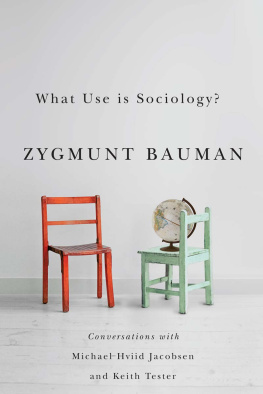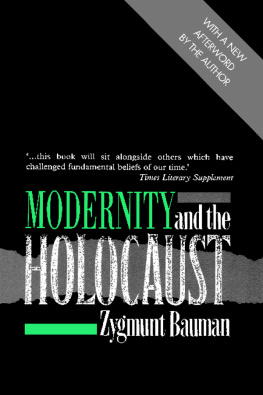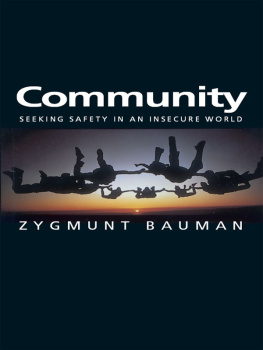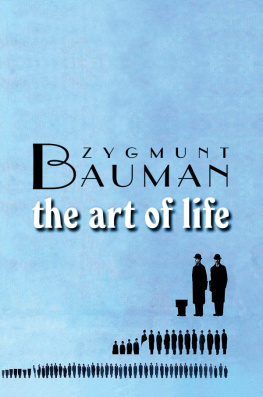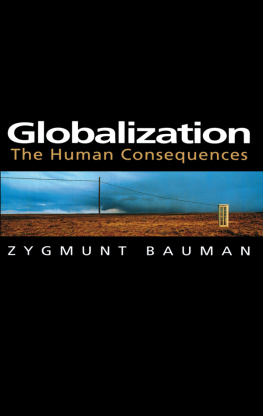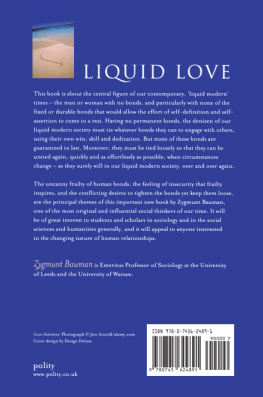ZYGMUNT BAUMAN
Public Intellectuals and the Sociology of Knowledge
Series Editors
Dr Andreas Hess, University College Dublin, Ireland
Dr Neil McLaughlin, McMaster University, Canada
The sociology of knowledge has a long and distinctive history. Its function has always been that of attempting to bridge the aspirations of the discursive and institutional founding fathers of sociology with that of modern attempts to define the discipline through the study of the emergence, role and social function of ideas. However, since Mannheim first outlined his program in the 1920s, the sociology of knowledge has undergone many changes. The field has become extremely differentiated and some of its best practitioners now sail under different flags and discuss their work under different headings. This new series charts the progress that has been made in recent times despite the different labels. Be it intellectual history Cambridge-style, the new sociology of ideas which is now gaining strength in North America, or the more European cultural analysis which is associated with the name of Bourdieu, this series aims at being inclusive while simultaneously striving for sociological insight and excellence. All too often modern attempts in the sociology of knowledge, broadly conceived, have only looked at form while they downplayed or disregarded content, substance of argument or meaning. This series will help to rectify this.
Zygmunt Bauman
Why Good People do Bad Things
SHAUN BEST
University of Manchester, UK
First published 2013 by Ashgate Publishing
Published 2016 by Routledge
2 Park Square, Milton Park, Abingdon, Oxon OX14 4RN
711 Third Avenue, New York, NY 10017, USA
Routledge is an imprint of the Taylor & Francis Group, an informa business
Copyright 2013 Shaun Best
Shaun Best has asserted his right under the Copyright, Designs and Patents Act, 1988, to be identified as the author of this work.
All rights reserved. No part of this book may be reprinted or reproduced or utilised in any form or by any electronic, mechanical, or other means, now known or hereafter invented, including photocopying and recording, or in any information storage or retrieval system, without permission in writing from the publishers.
Notice:
Product or corporate names may be trademarks or registered trademarks, and are used only for identification and explanation without intent to infringe.
British Library Cataloguing in Publication Data
Best, Shaun
Zygmunt Bauman : why good people do bad things. (Public intellectuals and the sociology of knowledge)
1. Bauman, Zygmunt, 1925 2. Bauman, Zygmunt, 1925 Political and social views. 3. Sociology Philosophy.
I. Title II. Series
301.092dc23
The Library of Congress has cataloged the printed edition as follows:
Best, Shaun.
Zygmunt Bauman : why good people do bad things / by Shaun Best.
pages cm(Public intellectuals and the sociology of knowledge)
Includes bibliographical references and index.
ISBN 978-1-4094-3588-4 (hardback)1. Bauman, Zygmunt, 1925- 2. Sociology.
I. Title.
HM479.B39B47 2013
301dc23
2012048043
ISBN 9781409435884 (hbk)
ISBN 9781315545974 (ebk)
Contents
Introduction
For Zygmunt Bauman, sociology is a product of modernity and, as such, sociology has never had the conceptual tools to provide a detached or credible evaluation of the processes of modernisation or the human consequences of modernity. Given this lack of adequate sociological conceptual tools, since the publication of Intimations of Postmodernity (1992) Baumans sociology has focused on reformulating the nature of sociologys theoretical programme, redefining the disciplines relationship with modernity, and giving the discipline a new sense of direction by presenting his own critiques of modernity. In his sociology of postmodernity and in his liquid turn writing, Bauman investigates key aspects of social life on the far side of modernity by the use of metaphor and poetic language. When Bauman addressed the ceremony for the Prince of Asturias Foundation prize in 2010, he described his work as a discipline of humanities, whose sole, noble and magnificent purpose is to enable and facilitate human understanding and interhuman ongoing dialogue (Bauman 2012a: 46).
This book identifies four distinct phases of Baumans work: phase one as a Marxist revisionist, writing about actually existing socialism in Poland; phase two as a Marxist revisionist, writing about socialism as an active utopia that could resolve the human problems facing the Western capitalist society; phase three in which Bauman loses faith in modernity in general and socialism in particular, a phase in which his work becomes associated with postmodernism, and finally; phase four as proponent of the liquid turn, in which Bauman distances himself from postmodernism and engages in an analysis of social change understood by Bauman as a process of liquefaction. The shift from phase two to phase three of Baumans work marks his transition from intellectual as legislator to interpreter and the shift from phase three to phase four was when Bauman became a public intellectual, when he attempted to engage in public rather than academic discourse. This activity was represented in Baumans decision to move away from producing large academic texts that explored aspects of social theory and analysis for the consumption of other sociologists to pocketbooks and interviews or conversations for a wider audience on themes as diverse as education, surveillance and identity, in which he attempts to present himself as a cultural and social critic. The principal concern of this book is to demonstrate that there are links between these phases of Baumans theorising and the circumstances in which he found himself and the decisions he made over the course of his life.
What is knowledge and how is it acquired? There are a number of assumptions that I have made about this question that underpin the arguments developed in the book. This means that, unlike Richard Rorty (1998), who attempts to separate Heideggers life from his work, on the grounds that even though Heidegger may have been a nasty figure, this does not affect significantly the content of his work, I am of the view that life and work are linked. Knowledge is produced by people in particular historical conditions, grounded in sensory experience, exercising choice, judgement and reflection on those experiences. Knowledge is never simply the product of an ideological stamp, dominant ideology, perspective of a dominant group, a reflection of the social structure, a product of symbolic violence or reducible to power relations or structural effects. Knowledge is plastic and pliable in the hands of the human agent. The agent can decide that some ways of viewing the world or some knowledge is better or worse than the known alternatives. Contributions to knowledge are constructed by the agent with resources available to them on the basis of criteria decided by the agent themselves as significant. The standpoint of the agent will shape their own analysis, making knowledge historically situated but not determined, something that is an achievement derived from a process of active and informed reflection. The knowledge constructed by the agent is never disinterested or objective, it will always be a point of view reflecting what is important to the agent who produced the knowledge.





